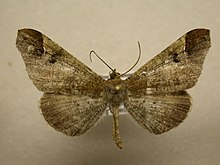絲角蝶科
| 絲角蝶科 | |
|---|---|

| |
| Macrosoma bahiata | |
| 科學分類 | |
| 界: | 動物界 Animalia |
| 門: | 節肢動物門 Arthropoda |
| 綱: | 昆蟲綱 Insecta |
| 目: | 鱗翅目 Lepidoptera |
| 亞目: | 有喙亞目 Glossata |
| 演化支: | 腔鱗類 Coelolepida |
| 演化支: | 肌旋喙類 Myoglossata |
| 演化支: | 新鱗翅類 Neolepidoptera |
| 下目: | 異脈下目 Heteroneura |
| 演化支: | 真鱗翅類 Eulepidoptera |
| 演化支: | 真異脈類 Euheteroneura |
| 演化支: | 雙孔類 Ditrysia |
| 派: | 木蠹蛾派 Cossina |
| 亞派: | 蠶蛾亞派 Bombycina |
| 總科: | 絲角蝶總科 Hedyloiea |
| 科: | 絲角蝶科 Hedylidae Guenée, 1857, nec. Bergh, 1895 |
| 模式種 | |
| Macrosoma tipulata Hübner, 1818 | |
| 屬 | |
|
絲角蝶屬 Macrosoma Hübner, 1818 | |
| 多樣性 | |
| 35 個被承認的物種 | |
絲角蝶科 (學名:Hedylidae),又名喜蝶科,是一類昆蟲,分類學上屬於鱗翅目鳳蝶總科下的一科。曾屬於蛾類,當時被視為鳳蝶總科的一個姐妹群。1986年,斯考伯根據當時的研究結論,合併了原有的所有屬為單一的絲角蝶屬(Macrosoma ),並從蛾類劃到蝶類,設立單一的絲角蝶總科(Hedyloidea),但目前已合併至鳳蝶總科。本科目前已發現的全部35個受承認的物種,均位於新熱帶界。[1]
分類學與系統發生學
[編輯]本科曾被分類為尺蛾科Oenochrominae亞科下的一個族[2],稱為絲角蛾族(Hedylicae),Prout LB[1]認為該族應當被視為一科。斯考伯首先提出了該科實際上是一種未被承認的蝴蝶的假說,同時認為其應當是「真正的蝴蝶」(即當時的「鳳蝶總科」,包括鳳蝶科,粉蝶科,灰蝶科,蛺蝶科,不包括弄蝶科)的姐妹群,因此單列一總科,稱絲角蝶總科(Hedyloidea)。韋恩特勞伯和米勒就斯考伯的這一假說展開了一些爭論[3]。韋勒· S·J 和 帕斯雷· D·P 在1995年發布了支持斯考伯觀點的分子生物學研究[4]。2005年的一項更全面的研究,基於 57 個樣本類群、3 個基因和 99 個形態特徵的數據,恢復了曾被取消的絲角蝶屬,並設立絲角蝶總科,作為鳳蝶總科和弄蝶總科共同的姐妹群[5]。蝴蝶下目的三大總科現已合併為單一的鳳蝶總科。2015年的系統發生學研究顯示,絲角蝶科應當作為鳳蝶總科(這裡包括弄蝶科)的基群,與雙孔次目螟蛾類中的蛾的關係比其他蝴蝶與這些蛾的關係更親密[6][7][8]。
由於假說中的若干個物種群落之間不存在明顯差異,加上基本的形態學研究,斯考伯在1986年合併了原有的五個屬為單一的絲角蝶屬。但是,絲角蝶屬的系統發生學仍有待進一步研究。
學名說明
[編輯]在動物界當中,存在着許多分類層級的學名與絲角蝶屬的學名Macrosoma 拼寫相同或者是同音詞[9]。例如:Macrosoma Leach 1819(爬行動物),Macrosoma de Haan 1826(蜻蛉目),Macrosoma Robineau-Desvoidy 1830(Macrosoma multisulcata Berlese 1913) ,雙翅目蠅科,Macrosoma Brandt 1835(腔腸動物),Macrosoma Hope 1837(鞘翅目),Macrosoma Lioy 1864 或 1865(雙翅目麻蠅科),Macrosoma Hammer 1979[10](M.rugosa; Acarina:Oribatidae)。
另有兩個Hedyle Guenée加劇了命名混亂的狀況,那就是Hedyle Guenée, 1857和Hedyle Bergh, 1895(Opisthobranchia 目Acochlidioidea 總科Hedylopsidae (Odhner, 1952)科的海牛[11],目前被歸類於 Hedylopsis Thiele,1931[12]。另有Hedyle Malmgren 1865(屬於多毛綱)[13]。因此,Hedylidae Bergh,1895及其模式種 Hedyle weberi Bergh,1895)也是無效的命名。
物種列表
[編輯]以下分類主要依照形態學進行。
DNA 序列
[編輯]本科的部分物種(例如Macrosoma semiermis等)接受了DNA測序,被測定的基因包括線粒體基因中的 「細胞色素氧化酶 I」、「ND1」,細胞核基因中的 「無翅基因」、「Ef-1?」[14]等。部分物種目前正在接受條形碼檢測。[15]
外部連結
[編輯]- Caterpillars, pupae, butterflies & moths of the ACG [Accessed March 2007]
- Hearing(頁面存檔備份,存於網際網路檔案館) [Accessed March 2007]
- Ears(頁面存檔備份,存於網際網路檔案館) [Accessed March 2007]
- Kendall 1976 pdf[永久失效連結] [Accessed March 2007]
- Lepindex [Accessed March 2007]
- Moths of Belize(頁面存檔備份,存於網際網路檔案館) [Accessed March 2007]
- Unknown white hedylid from Nicaragua(頁面存檔備份,存於網際網路檔案館) [Accessed March 2007]
- Hedylidae of Guyana(頁面存檔備份,存於網際網路檔案館) [Accessed March 2007]
- Moths of Jamaica(頁面存檔備份,存於網際網路檔案館) [Accessed March 2007]
- Barcoding progress and images [Accessed March 2007]
- Leptree sequencing progress [Accessed March 2007]
- Larva of unidentified species 79-SRNP-362c[永久失效連結] [Accessed March 2007]
- Larva of unidentified species 03-SRNP-21689[永久失效連結] [Accessed March 2007]
- Nicaraguan hostplants of Macrosoma semiermis [Accessed March 2007]
參考資料
[編輯]- Scoble, M.J. (1986). The structure and affinities of the Hedyloidea: a new concept of the butterflies. Bulletin of the British Museum (Natural History), Entomology Series, 53: 251-286.
- ^ 1.0 1.1 Scoble MJ. The structure and affinities of the Hedyloidea: a new concept of the butterflies. Bull. Brit. Mus. (nat. Hist.) (Ent.). 1986, 53: 251–286.
- ^ Scoble MJ. The structure and affinities of the Hedyloidea: a new concept of the butterflies. Bull. Brit. Mus. (nat. Hist.) (Ent.). 1986, 53: 251–286.
- ^ Weintraub JD, Miller JS. The structure and affinities of the Hedyloidea: a new concept of butterflies. Cladistics. 1987, 3 (3): 299–304. doi:10.1111/j.1096-0031.1987.tb00512.x.
- ^ Weller SJ, Pashley DP. In search of butterfly origins. Molecular Phylogenetics and Evolution. September 1995, 4 (3): 235–46. PMID 8845961. doi:10.1006/mpev.1995.1022.
- ^ Wahlberg N, Braby MF, Brower AV, et al. Synergistic effects of combining morphological and molecular data in resolving the phylogeny of butterflies and skippers. Proceedings of the Royal Society B. August 2005, 272 (1572): 1577–86. PMC 1560179
 . PMID 16048773. doi:10.1098/rspb.2005.3124.
. PMID 16048773. doi:10.1098/rspb.2005.3124.
- ^ Heikkilä, Maria; Mutanen, Marko; Wahlberg, Niklas; Sihvonen, Pasi; Kaila, Lauri. Elusive ditrysian phylogeny: An account of combining systematized morphology with molecular data (Lepidoptera). BMC Evolutionary Biology. 2015, 15. doi:10.1186/s12862-015-0520-0.
- ^ Heikkila, M.; Kaila, L.; Mutanen, M.; Pena, C.; Wahlberg, N. Cretaceous origin and repeated tertiary diversification of the redefined butterflies. Proceedings of the Royal Society B: Biological Sciences. 2011, 279 (1731): 1093. doi:10.1098/rspb.2011.1430.
- ^ Kawahara, A. Y.; Breinholt, J. W. Phylogenomics provides strong evidence for relationships of butterflies and moths. Proceedings of the Royal Society B: Biological Sciences. 2014, 281 (1788): 20140970. doi:10.1098/rspb.2014.0970.
- ^ Synonymy. [2017-11-27]. (原始內容存檔於2011-07-20).
- ^ Hammer, M. (1979). Investigations on the oribatid fauna of Java. K. Dan. Vidensk. Selsk. Biol. Skr., 22(9): 34.
- ^ 存档副本. [2017-11-27]. (原始內容存檔於2016-03-03).
- ^ 存档副本. [2007-04-15]. (原始內容存檔於2007-03-31).
- ^ 存档副本. [2017-11-27]. (原始內容存檔於2007-10-07).
- ^ Nucleotide sequences. [2017-12-07]. (原始內容存檔於2001-07-14).
- ^ DNA Barcodes for Macrosoma. [2017-12-07]. (原始內容存檔於2008-02-27).
